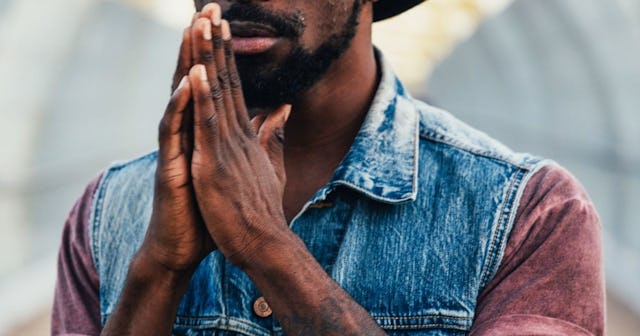I’m Not Sad, I’m Depressed -- And There’s A Difference

I was chatting with an old friend from high school online the other day. We were discussing our upcoming 20-year class reunion, a fact that honestly broke my heart to realize that yes, indeed, it had been 20 years. We were catching up on our lives, our children, the normal stuff. Then she asked a question I had a difficult time answering. “Are you happy?”
And you know what? This should be an easy answer, right? It should be a simple “yes” or “no,” and I’ll be honest, I wish it were. I wish it were something that could be summed up in a binary response. But when you are living with something as complicated as depression, the question of happiness is much more complicated than you’d think.
That really is one of the biggest misconceptions about depression. Most people see it as a case of the blues. They see it as a temporary sadness, something someone might experience after letdown, or a death in the family, or being passed up for a promotion. It is commonly viewed as something that can simply be overcome with a nice vacation or maybe a spa day. But I’m sorry, that’s not how it works.
In fact, one thing that really bothers me as someone who suffers from depression is how people use the term so casually, saying things like “Well that’s depressing,” when describing bad news online or when something doesn’t go their way. I mean, honestly, when your sugar is low you wouldn’t say, “My diabetes is acting up,” unless you actually had diabetes.
Louis Blythe/Stocksnap
I think what people who don’t suffer from depression need to understand is that it’s not a passing thing. It’s not something that you can just get over. Being sad, on the other hand … that has an exit strategy. Sadness is a mood, and can be turned to happiness with time and a little self-care, but depression is a life-long ailment.
What happens with depression is that your emotional state gets flipped upside down. Sorrow, feelings of failure, suicidal thoughts, and anxiety become your default. Without consistent effort, medication, and therapy, your mind slides into those thoughts.
That’s how it works.
I feel like I’m failing when I’m succeeding. I feel anxiety when there is nothing to fear. I feel sorrow when things are going well. I feel insecurity when my life is stable. Depression means sitting down regularly and thinking about life logically. It means looking at what is going well, and constantly reminding yourself that you have nothing to fear. It means finding the right mix of medication, and learning how to meditate so you can separate your brain from your body. It means taking up exercise so you are too tired to be anxious.
Now this isn’t to say that there aren’t good times and bad times when it comes to depression. There are. My obsessive compulsive disorder really started when I was 19. That same year, my father died. This was probably the darkest time in my life. I got really depressed and my OCD took over everything, and I came very close to taking my own life.
null/Stocksnap
Now I’m 37 and educated, with a career, a super sexy amazing wife, and a family of maddeningly-adorable kiddos. I take pills each day and I meet with a therapist. And even with all that, I still occasionally think about suicide.
But I also know that if I’d gone for it back when I was 19 and things were really bad, I’d never have meet my kids or my wife. I’d never have gone to school and gotten a good job. I’d have lost so much of my life up until now that was worth living.
Last month, my mental health was pretty bad. I was having those thoughts again, so I thought back to what I would’ve missed if I’d taken my life all those years ago. It didn’t remove the depression and it didn’t stop the anxiety, but it made me just optimistic enough to keep fighting. Ultimately, this is what the cycle of depression looks like, and if you are living with it, then you know finding something that keeps you fighting is a big deal.
So back to that chat with my high school friend. I considered the question for some time: “Are you happy?” In so many ways I wanted to just say “yes” because it’s easier. So much of living with depression means giving people the simple answer they want because it’s easier than explaining everything I’ve said above.
But instead, I told her that I have clinical depression. It told her that I have obsessive compulsive disorder, and that there are good times and bad times. But on the whole, I am managing it. I have good life, with a good marriage, and happy kids. “But am I happy?” I wrote. “Am I sad? Well… it’s not that simple.”
This article was originally published on